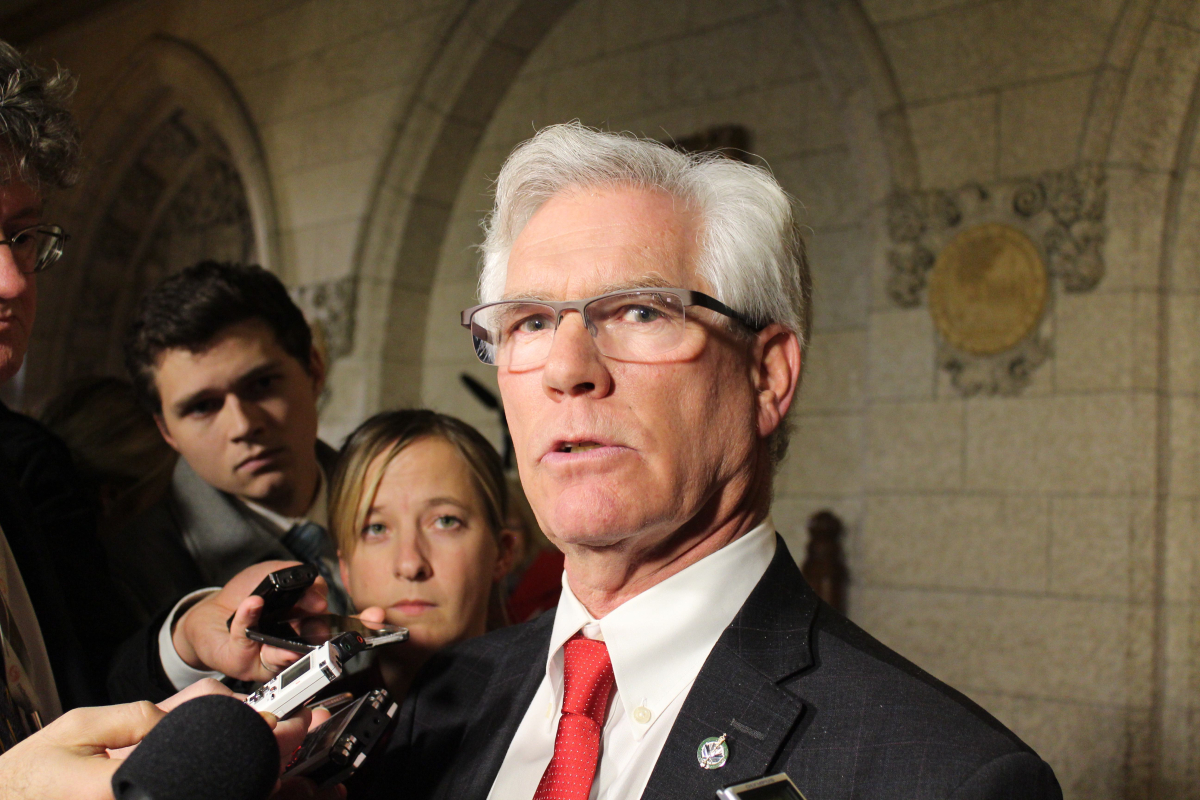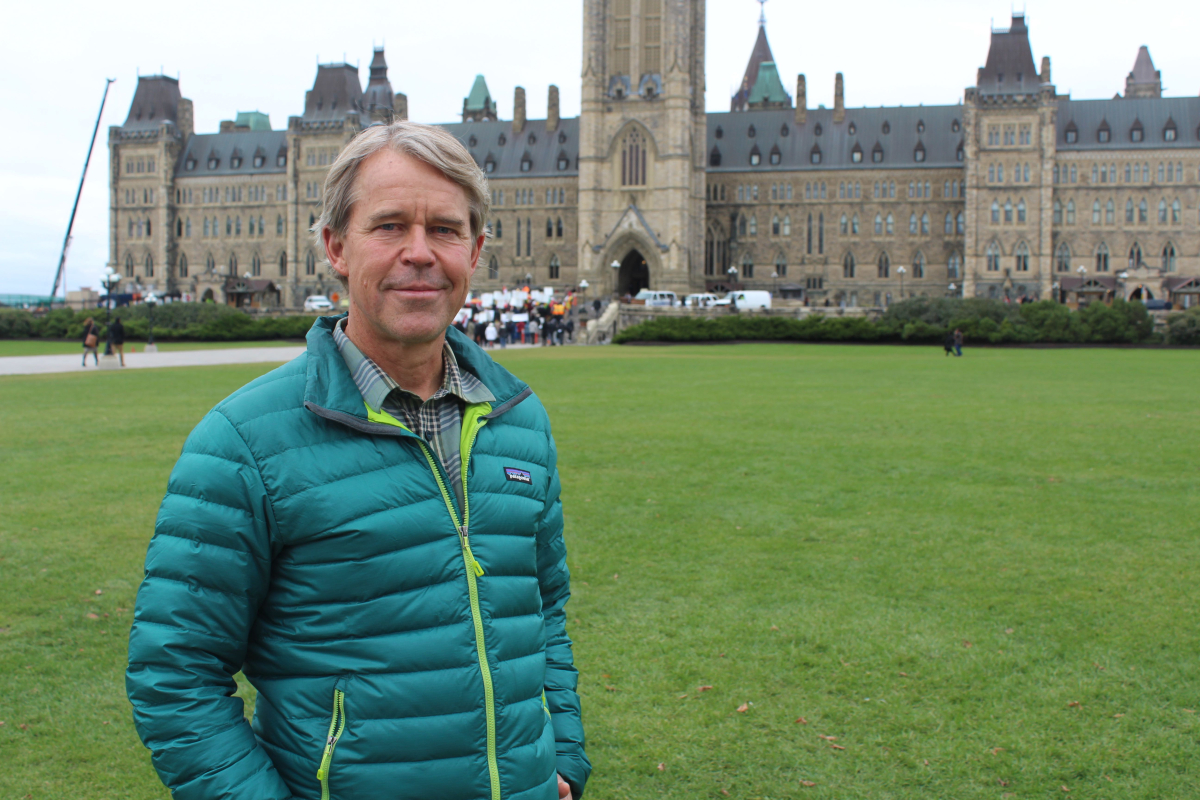Support strong Canadian climate journalism for 2025
Prime Minister Justin Trudeau says he has science on his side.
He and his cabinet ministers repeated this statement several times this week as they promoted a controversial decision to approve two new oil pipelines — Enbridge's Line 3 replacement and Kinder Morgan's Trans Mountain expansion — that could accommodate about one million barrels of oil per day from Canada's production.
The problem is that some scientists say the evidence flies in the face of what Trudeau called a safe project, the west-coast Kinder Morgan pipeline expansion. In fact, they say there is very little published evidence in the scientific literature about bitumen to back up the prime minister’s claims.
And one of the most glaring gaps of evidence, the scientists say, is the absence of any significant research on the effects of spills of bitumen — the heavy oil from Alberta’s oilsands industry that is expected to flow in the new pipelines — into the oceans.
Scientists shared findings with Trudeau's office
A group of scientists from Canadian and American universities reached these conclusions after a comprehensive review of thousands of scientific papers on oil and the environment. They found literature on impacts of oil spills, but very little published research about how bitumen affects marine organisms, as well as how spill response would affect these organisms. Their findings were peer-reviewed and are scheduled to be published later this month in the journal Frontiers in Ecology and the Environment.
In an interview with National Observer, three of the scientists said they gave advance copies of their findings to Trudeau’s office and others in his cabinet on Nov. 21, but it’s not clear what the government did with that evidence.
“It’s hard to imagine that the federal government decision (to approve new pipelines) could be based on science, just when we’ve found that in many cases, there’s very little science to base those decisions upon,” said Wendy Palen, an associate professor of biological sciences at Simon Fraser University in B.C., and one of the authors of the paper.

Palen, co-founder of the Earth to Ocean Research Group at the university, collaborated on the new study with lead author Stephanie Green, a Banting post-doctoral fellow at Stanford University in California, and Tom Sisk, director of the landscape conservation initiative at Northern Arizona University. There were five other co-authors.
Green said that the group received confirmation that the government had received the information.
“We just don't know how or if they considered it,” said Green, who is Canadian.
Evidence doesn't exist yet, say scientists
When asked on Tuesday whether the Trudeau government had reviewed all of the evidence from scientists, prior to making its decision, Natural Resources Minister Jim Carr said:
“There are scientific opinions that don't agree, one to the other. We’re satisfied that the scientific evidence that was available to the government in advance of this decision was good evidence and sufficient to make a good judgment.”
Palen said one of the key points of the study, given to Carr and other ministers, was that they didn’t have all the evidence.

For example, scientists don’t even know the chemical composition of the different varieties of the toxic liquid diluent when it is added to bitumen to help it flow through a pipeline because it is considered a trade secret of industry. This would make it hard for any expert to figure out how to clean up a spill in the ocean. It would also make it difficult to objectively evaluate a company's spill response plan, the scientists said.
“Some of these things are glaring holes in our understanding… especially in these unknown bitumen products,” Palen said. “What we would argue is that to assess risks, you have to have information about that risk and then make a good decision as a result of that information. If there’s no science underpinning that (decision) it draws into question whether the decision is responsible.”
Green said that the U.S. National Academy of Sciences and the National Oceanic and Atmospheric Administration had reached similar conclusions about gaps in research about the risks of bitumen in their own assessments of the science.
'Many unexamined risks'

Sisk said that this was one of many unexamined risks to the oceans from supertankers that are carrying bitumen from the oilsands. But he added that the government could help reassure scientists by being transparent about how they reached their decision.
“Either Minister Carr or the government will release a compendium of their scientific analysis in very near future, or they’re acting on very secretive information… that scientists won't be able to evaluate,” Sisk said. “I hope it’s the former.”
Another scientist told National Observer in a separate interview that she was also interested in seeing more evidence about potential impacts from increased tanker traffic on killer whales. Canada's National Energy Board has concluded the whales will likely face significant adverse impacts from the project and the regulator is requiring that Kinder Morgan mitigate this risk.
Caroline Fox, a post-doctoral conservation scientist at Dalhousie University and the Raincoast Conservation Foundation, said that additional evidence was needed to determine the adequacy of the company's plans to mitigate risk to the whales.
"We’d like to see that information and science in full," said Fox. "It’s pretty difficult to comment on mitigation strategies that you can't fully examine."
Green and Palen also said that the government has placed itself in an unusual situation since it has criticized the existing environmental review process for industrial projects, but accepted how it evaluated the projects approved this week. The government has launched comprehensive reviews of Canada’s environmental laws that have just gotten underway.
“It feels a little bit disingenuous,” Palen said.
with files from the Canadian Press
Editor's note: This story was updated with a new headline and additional background details at 9:45 pm on Wednesday







Comments
Is the diluent really a trade secret?
1) During the formal question and answer period for intervenors in the NEB process, the Burnaby Teachers Association asked Kinder Morgan for the composition of the diluent. Kinder Morgan did not tell them. It is this kind of thing that convinces people that it is a trade secret.
2) in a letter published in the Vancouver Sun on December 14, 2015, John Hunter pointed out that the composition can be found at crudemonitor.ca. There you will find listed such things as benzene, toluene, ethyl benzene, xylene, and other hydrocarbons.
So how can these two be reconciled? Perhaps Kinder Morgan adds something else which is a secret.
Nobody should be breathing this stuff when there is a spill. This could cause cancer years later, but it would be impossible to prove the cause
Cleaning dilbit out of water is highly unlikely, given it doesn't float. There is no mention in the article about chemical 'dispersants' used to supposedly clean up spills, but it's not a coincidence that Canada approved CorExit this year. It did so without notifying the public it was even being considered, or following the normal protocols. What science was used to approve it, or was it another rubber stamping on the 'evidence' provided by the company? When used in the Gulf of Mexico, it turned out that it doesn't disperse the oil at all, it binds to it, creating some sort of FrankenOil that has neither dispersed, nor degraded after 6 years. This product covers the sea floor and washes further into the vital wetlands with every tide. It kills all vegetation in it's path and has destroyed the thriving fishing and shellfish industries. Those that helped clean the spill - whether paid or volunteer - never got protective gear and are riddled with medical problems, or have already died. Despite the billions in promised compensation to residents, BP never paid a dime to thousands of residents that lost everything. It is the same M.O. everywhere they operate and devastation is their legacy. It took 3 weeks to raise a tug from shallow water and they utterly failed at cleaning up it's leak before it destroyed shellfish, kelp, etc. The effect on at least one Orca whale photographed swimming through it is unknown, as well as every other species unfortunate enough to be in the area.
Where is the Open, Transparent, science based decision-making? The Precautionary Principle? Or the readily accessible government we had after the election?
I hope you will keep at this angle. I understand that the government feels confidence about its legal case because courts won't weigh in on the quality of science that has been evaluated. The government thus needs to be pushed to indicate just precisely what science, with detailed references and sources, they have relied upon, to, in effect, deny climate science, in addition to the highlighted issues here about the lack of science on safety and recoverability after a spill.
I don't believe that our public officials actually have looked at science, and this is deeply disappointing for a group of people who hold all of our fates in their hands. Please press them, whether provincial or federal, to define and describe what science they understand and have sought enlightenment on, in regard to climate science. Clearly Andrew Weaver is capable of grasping both science and public policy angles. Why has his analysis not been sought? How is the government permitted to proceed based on some possible combination of wilful ignorance and provision of tainted materials from the industry that is meant to be being regulated?
How is that the government has endless time for meetings with fossil fuel lobbyists, and apparently no or little time to seek an independent understanding of the fairly simple and undebatable concepts of climate science?
How is that our government is being allowed to continue to argue that they can pick and choose the science that supports their intention, rather than seeking an objective measure of the conclusions of climate science, none of which favour expanded fossil fuel extraction and shipping. Our survival as a species, as well as the survival of numerous other species we share the planet with, rests on informed decision-making. How is it that our government feels no responsibility to seek unbiased sources? This would not wash in any profession, and clearly screams "conflict of interest".
A STUDY OF FATE AND BEHAVIOR OF DILUTED BITUMEN OILS ON MARINE WATERS
"This document is a final report for a series of physical and chemical tests that were conducted on
the fate and behavior of diluted bitumen oils at a test facility in Gainford, Alberta. Additionally, as
part of this study, a series of tests were conducted to determine the efficiency of various types of
oil spill response equipment under similar conditions."
https://www.transmountain.com/uploads/papers/1391734754-astudyoffateand…
The above report identifies the Burnaby Burrard Inlet spill in 2007 as being a dilsynbit called Albion Heavy
http://www.crudemonitor.ca/crude.php?acr=AHS
(sigh) Another Prime Minister who ignores inconvenient scientific information. Perhaps some deity whispers the truth in his ear?
I am a graduate of Chemical Engineering Technology. I have worked in the chemical industry and the environmental field, thus I feel that the concerns I pose below regarding the transportation of diluted bitumen by pipeline quite valid:
The proposal for the KinderMorgan pipeline is flawed (in more ways than just the one I present here) in that not all aspects appear to have been considered or disclosed.
I would like to alert all those responsible and accountable for permitting this pipeline to consider the one fact that it is diluted bitumen that will be transported by this pipeline, and NOT simply crude oil. This necessarily implies that suspended particulate matter will be a component of this 'sludge'.
Consequently the 'product' that will flow through this pipeline will evidently contain GRIT. No matter how fine the particulate matter, this in effect will be akin to transporting an abrasive material through a pipe over a long, mostly unobserved, distance with higher temperatures and rates of flow being factors as to the rate of erosion (abrasion) of the pipe's material.
Most people know what results from an abrasive material being rubbed on the skin - it abrades and ruptures. This is basically what will happen with any diluted bitumen pipeline in just a matter of time.
By continuously subjecting metal of any kind to this type of abrasive action it will deteriorate from within, thus any resulting weaknesses will not be visible until there is a burst. And most likely, transportation of diluted bitumen by this means will cause many simultaneous leaks, first at elbows and then bends in the pipe. Any allowance made for this will only serve to delay the inevitable spills.
Consequently the confidence level of spills resulting from this venture is 100%.
PS In the wake of the Husky spill in the North Saskatchewan, and Husky claiming ‘ground movement' as the cause, I would further emphasize that 'ground movement’ through mountain regions is much more likely.
Enbridge's tweet on the Line 3 replacement program & @NorthernGateway decision: ow.ly/LMSm306EcYd pic.twitter.com/mwM0uqOwXp
2:27 PM - 29 Nov 2016 Enbridge @Enbridge
and
Enbridge CEO raised to national exaltation by Alberta Venture:
http://albertaventure.com/2016/12/al-monaco-2016-business-person-year/
"To build a pipeline, all you need is world-class techhnical expertise, a strong position on climate policy, the trust of communities and partnerships with First Nations. Piece of cake".
Enbridge has none of the above; these claims are based on their multi-million dollar propaganda, legalese and non-disclosure machinations, and the obsequious NEB captured in the palm of their hand.
Ask any community, landowner, and First Nation contaminated by their "world-class technical expertise" , victims of their surreptitious land grabs, sleight of hand "maintenance and operational" activities, and lack of "consultation".
The business world has no conscience. Psychopathic greed, nothing less.
I don't know why you're even wasting time puzzling over the reason for the government's decision to OK the Kinder Morgen project. You say their reason smacks of a lack of transparency whereas it is the most transparent reason in the wonderful world of political hypocrisy. They've sent out a number of clear signals such as their original decision to use the discredited Harperian NEB process, their lack of repealing the omnibus bills responsible for a lack of environmental protections, their feeble attempt to placate public anger over the NEB recommendation by sending out a hasty and almost secret second toothless triumvirate panel polluted by the chairwoman being a buddy of Kinder Morgan, etc. . Clearly industry captured decision.
Some unjaded Canadians still want to believe that this government would have/will do the right thing. But you are absolutely right on all counts. They wanted us to believe what they never had any intention of doing (the right thing, based on SCIENCE).
Clearly motivated by greed, power, industry capture, and "oiled" palms.
Friends, the reason the petrocorps won't tell the scientists what the chemical composition of the different varieties of toxic liquid diluent is that they don't know themselves nor do they care. Typically diluent it is natural gas condensate but refined naphtha or synthetic crude can also be used. The key point to remember is that the diluent represents a substantial cost to the industry. As a consequence the industry will always use whatever is the cheapest and most easily available diluent. Condensate from natural gas varies in its chemical composition because the natural gas deposits vary in their chemical composition. From the industry's perspective, all that is necessary is to dilute the bitumen to the point that its viscosity is lowered to the point that it will actually flow through a pipe under pressure. The only trade secret is not in fact a secret at all. Regardless of the adverse health and environmental impacts the could result, the industry is focused solely on reducing cost to maximize profit. There is nothing unusual about this, indeed any other focus would be the anomaly.
jim carr could not find his arse if his mouth was Open
jim carr could not find his arse if his mouth was Open